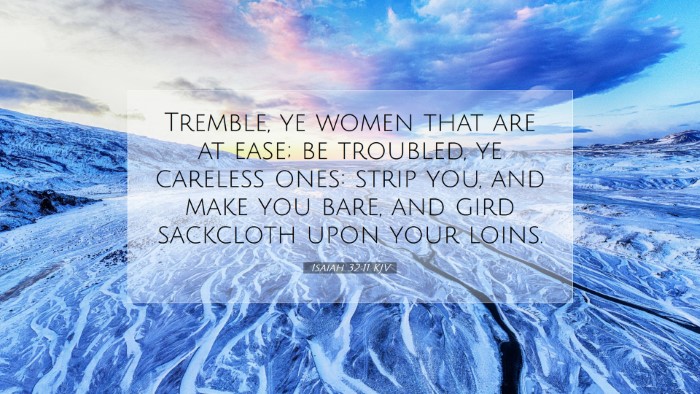Commentary on Isaiah 32:11
Verse Context: Isaiah 32:11 states, "Tremble, ye women that are at ease; be troubled, ye careless ones: strip you, and make you bare, and gird sackcloth upon your loins." This verse is a significant call to attention, aimed particularly at the complacent women of Jerusalem, who represent a broader societal attitude of indifference and luxury amidst impending judgment.
Exposition of the Verse
In this verse, we observe a vivid contrast between the complacency of the people and the coming changes that would affect their lives. The prophet Isaiah invokes a sense of urgency and alarm, urging the inhabitants of Jerusalem to abandon their state of false security.
1. The Call to Tremble
Isaiah's exhortation to "tremble" signals a shift from comfort to disquiet. Matthew Henry notes that the women, often symbols of comfort and domestic tranquility, are specifically addressed. This highlights the pervasive nature of judgment that even the seemingly secure will not escape. The ease in which they have lived has insulated them from the realities of impending judgment.
2. The State of Carelessness
According to Albert Barnes, the term "careless" refers to those who have not considered the consequences of their actions or the state of their souls. This carelessness is not merely a lack of concern, but an active decision to ignore the warnings that God has provided through His prophets. The women of Jerusalem are representative of a broader societal temptation to prioritize comfort over vigilance.
3. Symbolism of Stripping and Sorrow
When Isaiah commands them to "strip you, and make you bare," it symbolizes a complete removal of their false sense of safety. Adam Clarke comments that this act of stripping signifies the exposure of their sins and the need for repentance. Bemoaning one’s sins and recognizing the gravity of one’s condition is crucial before redemption can take place.
4. Garb of Mourning
The instruction to "gird sackcloth upon your loins" is further indicative of a posture of mourning and repentance. Sackcloth was a traditional garment worn in Ancient Israel during times of mourning and lamentation. This indicates a necessary turning from complacency to a place of humility before God.
Theological Implications
The message in Isaiah 32:11 extends beyond its immediate historical context and serves as a timeless reminder for both individuals and congregations. Theological reflections drawn from the commentaries suggest the following points:
- Human Complacency: The tendency for human beings to grow comfortable in their prosperity often leads to spiritual blindness. The call to tremble reminds us of our need for vigilance and self-examination.
- Suffering and Repentance: Suffering often serves as a catalyst for repentance. God uses various means to draw His people back to Himself, and moments of discomfort catalyze a deeper understanding of His holiness and their need for grace.
- Divine Judgments: The warnings issued through prophets like Isaiah hold relevance today: divine judgment may come unannounced, and the careless must be prepared to confront their spiritual negligence.
- The Cost of Disobedience: The call to strip and gird sackcloth implies that disobedience carries a price. There is both a physical and spiritual implication of digging deep into one’s self to confront the futility of a carefree existence devoid of God.
Applications for Modern Believers
In applying the principles from Isaiah 32:11, contemporary Christians are encouraged to reflect on the following:
- Self-Examination: Just as the women were called to account, modern believers should periodically assess their spiritual lives, ensuring that they are not lulled into complacency by the comforts of life.
- Cultivating Awareness: It is essential to remain aware of the world’s spiritual condition. Engaging with scripture and teachings that emphasize vigilance and discernment aids in combatting the culture of ease.
- Embracing Humility: The act of mourning for both personal sins and societal issues can draw believers closer to God. Embracing humility is vital for authentic spirituality.
- Promoting Community Repentance: Church leaders should foster an environment where confession and repentance are seen as strengths rather than weaknesses. Corporate lamentation before God can rejuvenate a community.
Conclusion
Isaiah 32:11 serves as a profound reminder about the dangers of complacency in the lives of God’s people. God calls His followers to wake up from the slumber of carelessness and to gird themselves with humility and repentance. As Matthew Henry, Albert Barnes, and Adam Clarke illuminate the verse's depth, their insights echo a call that transcends time, urging each generation to maintain a posture of vigilance in the face of divine holiness.


